News
SERAP, NGE urge Tinubu to direct immediate release of Dele Farotimi, stop targeting journalists, activists
Published
1 year agoon

Socio-Economic Rights and Accountability Project (SERAP) and Nigeria Guild of Editors (NGE), on Tuesday, urged “the government of President Bola Tinubu to immediately and unconditionally release activist Dele Farotimi and drop all charges of criminal defamation and cybercrimes against him, as he is detained solely for the peaceful exercise of his human rights.”
The groups in a joint statement at a press conference on the theme: ‘Nigeria: Backsliding on Human Rights and Media Freedom’ at the Shelton Hotels, Ikeja, in commemoration of the International Human Rights Day, called on “the Tinubu administration to immediately and unconditionally release all journalists, bloggers, human rights defenders and activists currently detained solely for the peaceful exercise of their human rights and doing their legitimate work.”
The groups in the joint statement, signed by Kolawole Oluware, SERAP Deputy Director, and Iyobosa Uwugiaren, NGE General Secretrary, expressed “concerns about the escalating crackdown on the rights to freedom of expression, peaceful assembly, association and media freedom and the flagrant disregard for the rule of law by Nigerian authorities.”
The groups also expressed “Impunity for those who threaten, intimidate and harass journalists, bloggers, human rights defenders and activists exacerbates the hostile environment for these defenders of constitutionally and internationally guaranteed human rights in Nigeria.”
The statement, read in part: “Nigerian authorities should safeguard, not stifle, human rights and the rule of law in the country.”
“We call on the Nigerian authorities to stop weaponizing criminal defamation and cybercrime laws to target and attack journalists, bloggers, human rights defenders and activists and to stop detaining and imprisoning them solely for doing their jobs.”
“We urge President Tinubu and his government to publicly call on Nigeria’s state governors, the Nigerian Police Force, the Department of State Services (DSS) to uphold and ensure full respect for the rights of everyone in the country including journalists, bloggers, human rights defenders and activists.”
“We are concerned that journalists, bloggers, human rights defenders and activists face significant obstacles, and even criminal charges and arbitrary detention solely for peacefully exercising their human rights and carrying out their legitimate work in the country.”
“Impunity for violations of the human rights of journalists, bloggers, human rights defenders and activists continues to seriously impair human rights including the rights to freedom of expression, peaceful assembly, association, information and media freedom, and discourage critical reporting by the media.”
“Nigerian authorities at all levels increasingly use criminal defamation laws and other repressive laws to crackdown on human rights and peaceful dissent, bringing frivolous lawsuits against journalists, bloggers, human rights defenders and activists.”
“We are also concerned about the persistence of threats to journalists’ safety, and the potential chilling effect of strategic lawsuits against public participation (SLAPPs) and harassment, including by security agencies and politicians.”
“We are concerned about the growing reports that journalists, bloggers, human rights defenders and activists continue to be intimidated and harassed by invasive state surveillance, including through the use of commercial spyware, abusive legal actions, and coordinated online smear campaigns.”
“We note that surveillance technology companies also continue to fail to conform with international human rights standards including the UN Guiding Principles on Business and Human Rights.”
“In particular, there has been non-conformity with the requirement to publicly disclose robust human rights due diligence for all proposed transfers and exportation of surveillance technology.”
“We note that journalists, bloggers, human rights defenders and activists play an indispensable role in documenting and reporting on human rights violations.”
“We note that the right to freedom of expression applies to all kinds of information and ideas, including those that may shock, offend or disturb, and irrespective of the truth or falsehood of the content.”
“An independent and diverse media that disseminates a wide range of information and ideas plays a critical role in supporting the functioning of a democratic society.”
“Indeed, a free, uncensored and unhindered press or other media is essential in any society to ensure freedom of opinion and expression and the enjoyment of other human rights.”
“We also call on President Tinubu and his government to ensure the prompt, thorough, impartial, transparent and effective investigations into all allegations of human rights violations against journalists, bloggers, human rights defenders and activists and to ensure that those suspected to be responsible for are brought to justice as well as provide access to justice and effective remedies to victims.”
“We urge President Tinubu and his government to review laws like the Official Secrets Act, Criminal Code Act and Cybercrime Act for potential restrictions on free speech and press; and amend them in line with international human rights standards.”
“These laws continue to erode citizens’ enjoyment of their human rights and media freedom.”
“We call on President Tinubu and his government, the country’s 36 governors and Federal Capital Territory (FCT) minister to genuinely uphold press freedom, ensure access to information to all Nigerians, obey court judgments, and respect the rule of law.”
“We urge President Tinubu and his government to strengthen the independence of regulatory bodies like the NBC and Nigerian Press Council (NPC) to ensure impartial regulation and promote self-regulation within the media.”
“We urge the Attorney General to push for the immediate amendment of the Cybercrimes Act, criminal defamation laws and other repressive legislation, and bring these laws in line with the Nigerian Constitution of 1999 (as amended) and international human rights obligations to which Nigeria is a state party.”
“We urge the Attorney General to advise President Bola Tinubu to promptly obey all outstanding court judgments including the ECOWAS Court judgment directing the Federal Government to repeal the repressive Cybercrimes Act and bring it in conformity with Nigeria’s international human rights obligations and commitments.”
“We urge the Minister of Information to ensure that the regulatory mechanisms including the National Broadcasting Commission are independent and promote self-regulation of the media.”
“We call on the National Broadcasting Commission (NBC) to stop using its codes to clampdown on broadcast stations and to impose arbitrary fines on them. The NBC must review its codes to bring them in line with the Nigerian Constitution 1999 [as amended] and international human rights standards.”
“We call on the NBC to implement the judgment of the Federal High Court in Lagos which ordered the Commission stop using the NBC Act and the Nigeria Broadcasting Code to impose fines, threaten to impose sanctions, harass and intimidate the broadcast stations and other independent media houses in the country.”
“We urge the National Assembly to promptly and comprehensively review criminal defamation laws and Cybercrimes Act and other restrictive legislation, and revise them as appropriate to bring them into line with Nigeria’s international human rights obligations and commitments.”
“We urge the National Assembly to immediately drop any social media and other bills that would restrict freedom of expression, media freedom and civic space and undermine the effective enjoyment of these rights in Nigeria.”
“We urge state governors to ensure that security agencies, the Nigeria Police Force and other authorities drop all charges against journalists, bloggers and other media workers, and critics, and cease further arbitrary closures of radio and television stations.”
“We urge state governors to publicly support and commit to the protection and promotion of the right to freedom of expression, access to information and the media freedom, including public reporting of sensitive political and other issues within their states.”
“We urge state governors to ensure that any government or security officials found responsible for obstructing, abusing, or attacking journalists, critics or media organisations are appropriately disciplined or prosecuted.””We urge state governors to ensure adequate compensation and reparation for victims of human rights violations in their respective states, including restitution, satisfaction, and guarantee of non-repetition.
“We urge the international community to hold Nigerian authorities to account for violations of human rights in the country including by calling on the authorities at both the Federal and state levels to immediately and unconditionally release anyone detained solely for peacefully exercising their human rights and to immediately withdraw any charges against them.”
“We urge the international community to encourage the Nigerian authorities to uphold constitutional and international human rights obligations on human rights and to respect, protect, promote and fulfil these rights.”
“We urge the Tinubu administration, the country’s 36 governors and FCT minister to genuinely uphold press freedom, ensure access to information to all Nigerians, obey court judgments, and respect the rule of law.”
“We urge Nigerian authorities at all levels of government to stop using repressive and anti-media laws such as the Cybercrimes Act and some codes of the National Broadcasting Commission (NBC) to target, intimidate and harass journalists, critics and media houses.
“We note that the suppression of the press in recent times takes various forms ranging from extrajudicial to unlawful detentions, disappearances, malicious prosecutions and wrongful use of both legislation and law enforcement.”
“Nigeria as a country has a long and unpleasant history of press gagging and clampdown on media freedom, which is evidence of extensive state censorship of media and in some cases, the utter control of state-owned media houses.”
“This position has not changed considerably despite almost 25 years of unbroken democratic rule in the Fourth Republic.”
“The rights to freedom of expression, peaceful assembly, association and media freedom are guaranteed under the Nigerian Constitution 1999 [as amended] and human rights treaties to which Nigeria is a state party.”
“Successive governments have made commitments to uphold and ensure the enjoyment of these human rights and media freedom.”
“However, we are concerned about the deteriorating situation of human rights and the rule of law in the country and longstanding impunity for violations of the rights of journalists, bloggers, human rights defenders and activists.”
“According to the Centre for Journalism Innovation and Development (CJID) Press Attack Tracker, there have been 110 verified attacks in the year 2024. In comparison to the previous year, the press attacks between the first and third quarter of 2024 have surpassed that of the entire year in 2023.”
“The perpetrators documented in the Tracker include state actors, outlaws, security operatives, private individuals and unknown persons. The forms of abuse were of the typical types, physical attacks, \threats and harassment, unlawful arrests, unlawful imprisonment, strategic litigation against public participation (SLAPP), cyberbullying.”
“The most recurrent charges were under the Cybercrimes Act of 2015 and criminal defamation under the Criminal Code Act.”
“According to the Wole Soyinka Centre for Investigative Journalism (WSCIJ), the Nigeria Police Force (NPF) and politicians are responsible for over 70 per cent of harassment and risks faced by Nigerian journalists, particularly during elections and civic demonstrations.”
“Nurudeen Akewushola, a porter with ICIR and Dayo Aiyetan, ICIR Executive Director were reportedly arrested and subjected to continuous question for over 9 hours over allegations of cyberstalking and defamation of character stemming from a report written in February 2024.”
“According to the Committee to Protect Journalists to In western Lagos State, police officers harassed Bernard Akede, a reporter with News Central TV, and his colleagues, digital reporter Eric Thomas and camera operators Karina Adobaba-Harry and Samuel Chukwu, forcing them to pause reporting on the planned protests at the Lekki toll gate.”
“In Abuja, police officers arrested Jide Oyekunle, a photojournalist with the Daily Independent newspaper, and Kayode Jaiyeola, a photojournalist with Punch newspaper, as they covered protests.”
“In northern Borno State, at least 10 armed police officers forcefully entered the office of the regional broadcaster Radio Ndarason Internationale (RNI) and detained nine members of staff for five hours.”
“In Abuja, police officers threw tear gas canisters at Mary Adeboye, a camera operator with News Central TV; Samuel Akpan, a senior reporter with TheCable news site; and Adefemola Akintade, a reporter with the Peoples Gazette news site. The canisters struck Adeboye and Akpan’s legs, causing swelling.”
“In northern Kano city, unidentified attackers wielding machetes and sticks smashed the windows of a Channels Television-branded bus carrying 11 journalists and a car carrying two journalists.”
“These cases illustrate ongoing harassment, intimidation and attacks on journalists, bloggers, human rights defenders and activists.”
The press conference was attended by senior members of the media, civil society groups and other stakeholders. Those who attended the event included: Richard Akinnola; Eze Anaba, President, NGE; and Dr Iyobosa Uwugiaren.
Others who attended the event included: Juliet Bumah, editor, News Telegraph; Onuoha Ukeh, MD, The Sun; Mustapha Isah, Director of News, Silverbird TV; Dayo Bodurin, Director of News, AIT; Don Okere, editor Daily Independent; and Daniel Badra, director, Guardian.
You may like
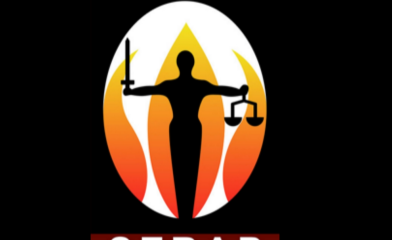

‘Account for security votes spending, invite EFCC, ICPC’, SERAP tells 36 governors


SERAP and NGE call for End to repressive laws and protection for Journalists on Human Rights Day


Human Rights Day: NGE and SERAP condemn growing violations of media freedom
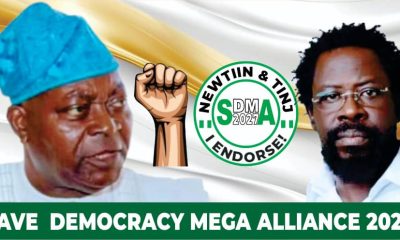

Group urges Tinubu, CJN to free Farotimi, redeem image of judiciary
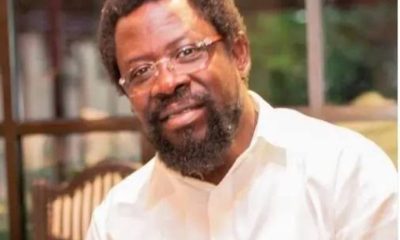

Obi protests remand of Farotimi in prison
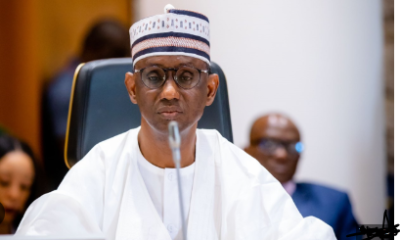

Ribadu urges Media to promote National cohesion and responsible reporting
Trending

 Entertainment7 days ago
Entertainment7 days agoSinger Simi faces backlash after TikToker admits to false rape allegation

 Entertainment4 days ago
Entertainment4 days agoSimi addresses resurfaced 2012 tweets amid online backlash

 Comments and Issues6 days ago
Comments and Issues6 days agoNigeria’s Declining Oil Output and Soaring Foreign Portfolio Investment Inflow

 Business7 days ago
Business7 days agoPENGASSAN warns Tinubu’s executive order on oil revenues could jeopardise 4,000 jobs

 Comments and Issues6 days ago
Comments and Issues6 days agoEx-prince Andrew’s arrest, lessons for Nigeria

 Health1 week ago
Health1 week agoNanoplastics may disrupt brain cells that control puberty, fertility, study finds

 Health5 days ago
Health5 days agoSCFN, LUTH introduce bone marrow transplants as curative treatment for sickle cell
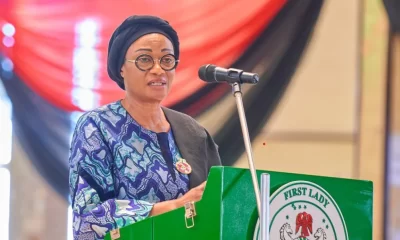
 Editorial Opinion1 week ago
Editorial Opinion1 week agoFirst Lady, Senator Oluremi Tinubu: A call to purpose beyond symbolism

